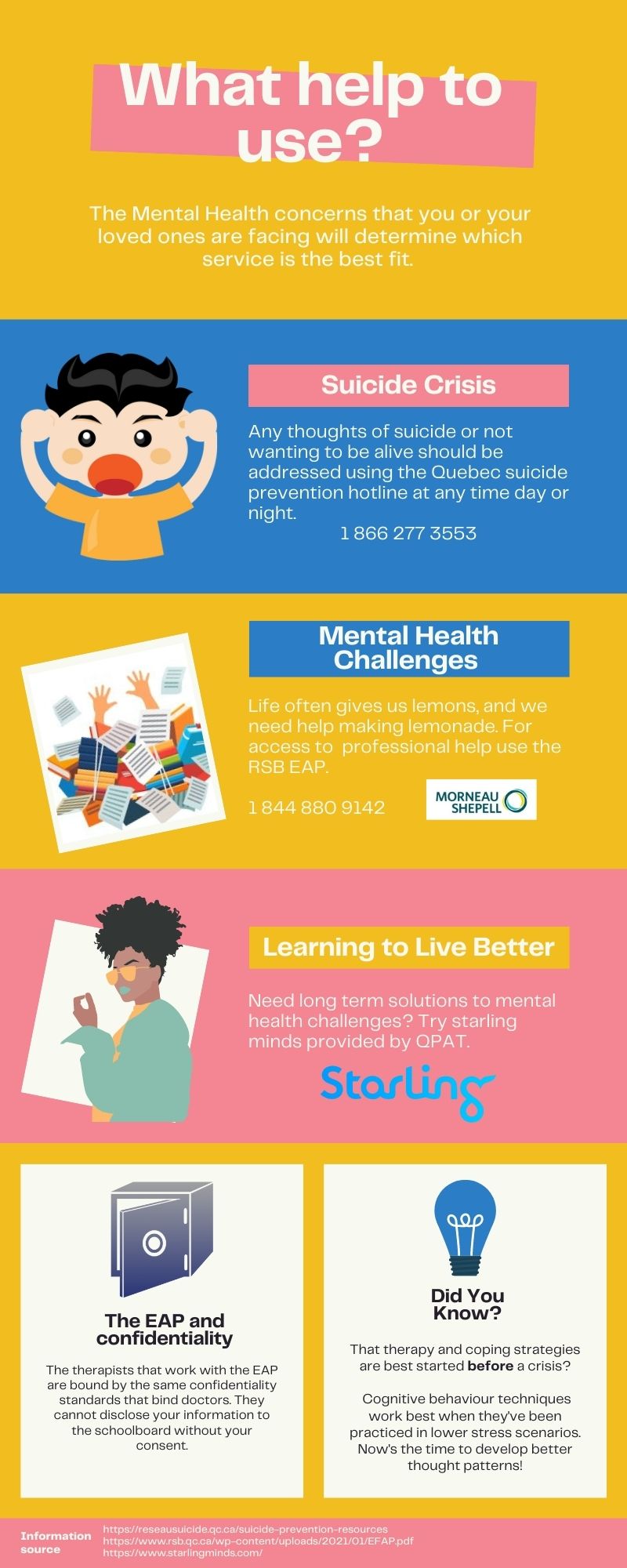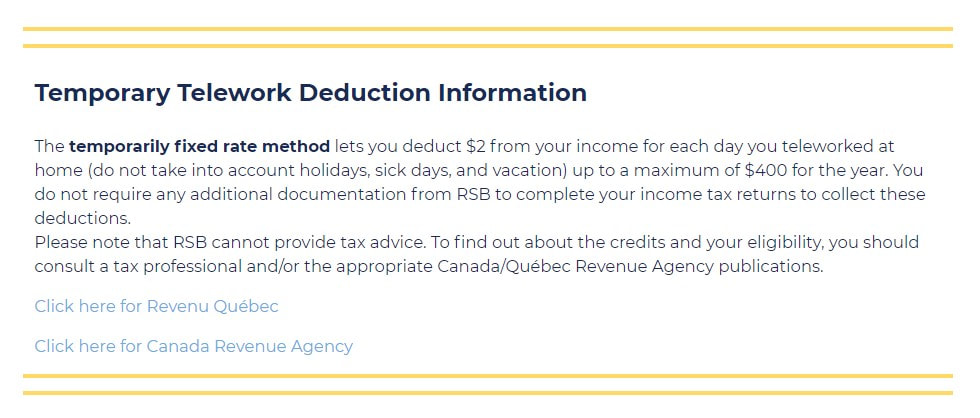<
>
Suicide Prevention First, If you or someone you know is experiencing suicidal thoughts like:
Contact 1 866 277 3553 at any time 24/7. For more information on suicide visit Quebec.ca Employee Assistance Plan - RSB (1 877 257 5557) There are many mental health challenges that people face that are immediate and require the help of a professional but are not life-threatening. Some examples are personal relationship problems, losing a loved one, conflict at work, and many others. Some signs that you could use some help are:
In this case, RSB’s EAP is an excellent choice. EAP stands for Employee Assistance Plan. Through this plan yourself and your family have access to 5 hours of therapy per issue. For example, you’ve been feeling pressured at work and it’s stared to affect your ability to relax outside of work. You could use 5 hours of therapy for this. At the same time your child is being bullied at school, they can use 5 hours of therapy for this. Meanwhile, a change in job responsibilities is causing your spouse undue stress, causing irritability, they can use 5 hours for this. In addition, a family member dies, you all get an individual 5 hours to deal with this issue. EAP Confidentiality RSB is not informed which employees are using the plan or why. This would breach the prescribed standards of confidentiality set by the Quebec government.(source) Licensed therapists cannot disclose your mental health records any more than doctors can without your consent. If they do, they can be subject to disciplinary actions. This does mean that you cannot ask for your spouse’s or adult children’s records. In order to access the EAP service any member of your family can phone 1 877 2575557 at any time. Your family members simply need to identify which RSB employee they are related to. There is also an app that can be used. Info here. Starling Minds - QPAT If you want to follow a program on your own time that will help with skills for general well-being and to practice before a crisis, then starling minds may be a good choice. This program is provided to you and your family by QPAT. If you were considering headspace, or other paid for well-being apps, try this one first. This site is about practising new ways to think, breathe and approach life. It’s a long term endeavour. You don’t wait for the big game to try a slap shot, and the same applies here. Use this program right now! Practice the techniques when life is easier, so that when it’s hard you use them automatically. Stay healthy and know that there are help services there for you! edited March 24 to make EAP number easier to find. updated 1/11/2021 new phone number and information for EAP One of the benefits afforded to teachers in our provincial system is the ability to take leaves of absence. Most leaves are unpaid but allow a teacher to retain their permanent position and seniority while taking up to two years off work. There are three main types of leaves of absence, part-time leaves, deferred pay leave, and full-time leaves.
1. Part time leave For example, this type of leave is when a teacher would like to work 80% instead of a hundred percent. You work and are paid according to the percentage you remain working. This type of leave is most often granted to elementary school teachers because the scheduling is easier. 2. Deferred pay leave This type of leave is an agreement that lasts for 4 or 5 years. If you opt for the 4-year plan, each of the years you receive 75% salary. You work three years at 100% and take the last year off. In the 5-year plan, each year you receive 80% salary. You work four years and take the fifth year off. 3. Full-time leave for up to 2 years Is what it sounds like. You don’t work in education, and they don’t pay you. There are some key things to take into account when considering a leave. Once the board agrees to your request for a leave it is considered binding. The board is under no obligation to take you back early or provide you with 100% work. Weigh your situation carefully before asking for a leave. Questions to answer before requesting any type of leave: Budget, can you afford a cut in your salary? What happens if your partner loses their job and you were the only bread winner? Will you miss working? What are some of the intangibles you get from going to work every day? Do you have a plan for your year off? Additional Things to consider for Full-Time leaves:
In the case of deferred leaves and partial leaves of 80%, work pension and insurance are unaffected. In all cases, seniority is unaffected, you accrue one year seniority as if you worked. However, you may not increase on the pay scale unless you work the equivalent of 155 days of the 200. The year off in deferred and full-time leaves result in a year you do not increase your pay step. So, you’ve answered all of the above question and thought about your budgets, and you want to do it? Awesome! All you need to do is fill out the linked form and submit it to HR before March 1st. |
�
Archives
June 2024
Categories
All
|
RTU-SER10 Boul. Churchill, Suite 201,
Greenfield Park (Québec) J4V 2L7 |
|


 RSS Feed
RSS Feed